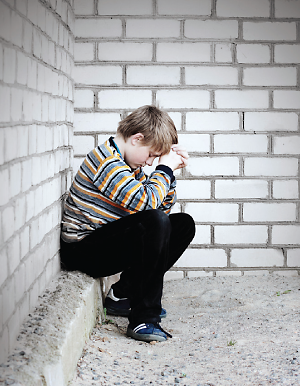MH Care Scarce for Kids in Child-Welfare System
Abstract
Young children who are the subject of investigations by child-welfare agencies because of allegations of maltreatment have a higher prevalence of mental health problems than their peers, and very few receive treatment for those problems. And that situation is a services system and social policy failure.

Effective interventions for mental health concerns are available, but few of the children seen by child-welfare agencies are receiving them.
Sarah McCue Horwitz, Ph.D., a professor in the Department of Pediatrics and the Centers for Health Policy and Primary Care and Outcomes Research at Stanford University, and colleagues made that pronouncement after evaluating data from the second National Survey of Child and Adolescent Well-Being (NSCAW II), a longitudinal study of 5,872 children from infancy to age 17.5 referred to child-welfare agencies for an investigation of potential maltreatment. The investigations were completed during the sampling period, February 2008 to April 2009. They reported their results in the June Journal of the American Academy of Child and Adolescent Psychiatry.
For children aged 12 to 18 months who were part of the survey, caregivers were administered the Brief Infant-Toddler Social Emotional Assessment (BITSEA), a 42-item screening tool designed to identify children at risk for social-emotional problems and low social competence. For children aged 19 to 36 months, caregivers were administered the Child Behavior Checklist 1.5-5 (CBCL 1.5-5).
The results were disturbing: in all, the scores for 34.6 percent of children aged 12 to 18 months were high on the Problem Scale of the BITSEA, and 20.9 percent on the Competence Scale, while for 10 percent of those aged 19 to 36 months the scores were over the CBCL clinical cutoff, indicating the need for mental health services. Children of black ethnicity were less likely to have elevated scores on the BITSEA Problem Scale, and children who lived with a never-married caregiver were five times more likely to have elevated scores.
Competence problems were associated with prior child-welfare-system history, and elevated CBCL scores were associated with living with a depressed caregiver. But what the researchers found distressing was that few of the children with identified mental health problems—only 2.2 percent— received mental health services.
Because treatment of mental health problems in infants and toddlers is likely to involve parenting-skills training, Horwitz and her colleagues also looked at use of such services. “When we added parenting-skills training that might be related to the treatment of child problems, 19.2 percent received such a service,” the researchers noted.
“The fact that so many very young children in contact with child welfare are showing signs of social and emotional problems is somewhat surprising, but that so few children and caregivers receive any services is disturbing given that effective interventions are available and could produce positive changes in the lives of these children,” said Horwitz, in a press release discussing the study.
The researchers made clear the course of action dictated by their findings: “There are data to suggest that evidence-based early intervention services potentially can improve mental health outcomes, and this underscores the need for more aggressive efforts to identify and treat vulnerable young children who are investigated by child welfare agencies,” they wrote.
“At the very least, we have the obligation to ensure that the following goals are met: that there are adequate services to identify and treat the very young by training additional professionals to address mental health problems in preschool children; to include assessments for mental health problems in routine screening; and to put in place targeted, efficacious prevention programs for high-risk families.”
The study was supported by an award from the National Institute of Mental Health. 
“Mental Health Problems in Young Children Investigated by U.S. Child Welfare Agencies” is posted at www.ncbi.nlm.nih.gov/pubmed/22632617.



